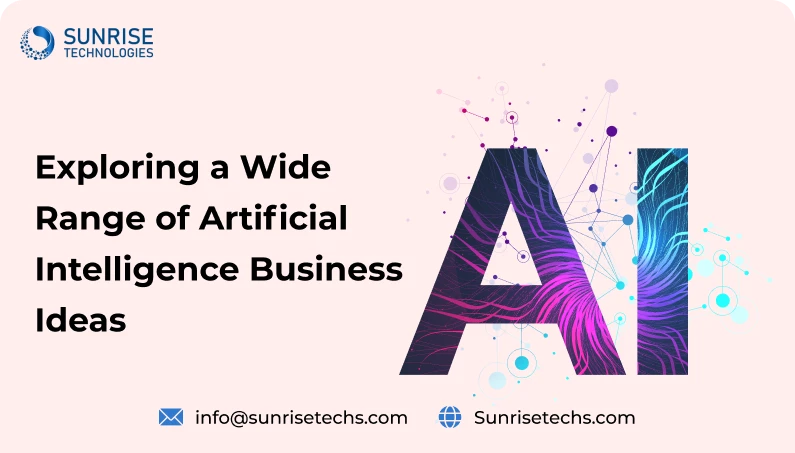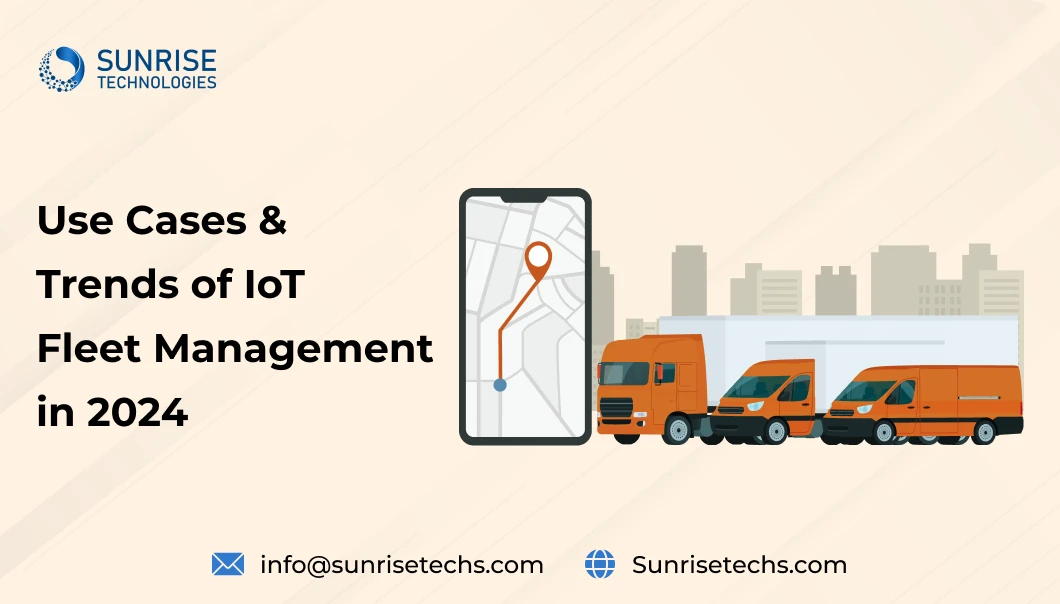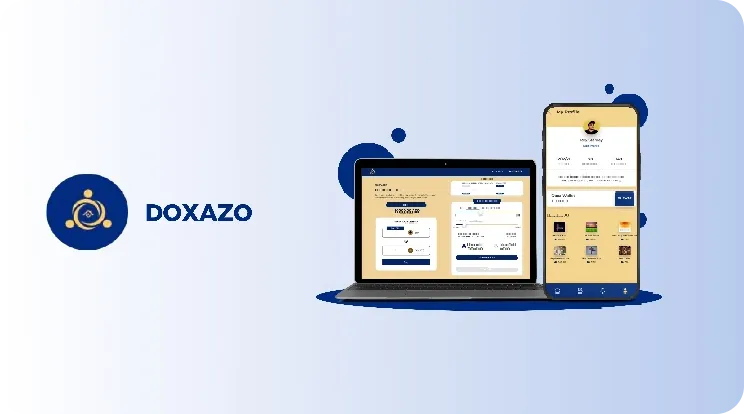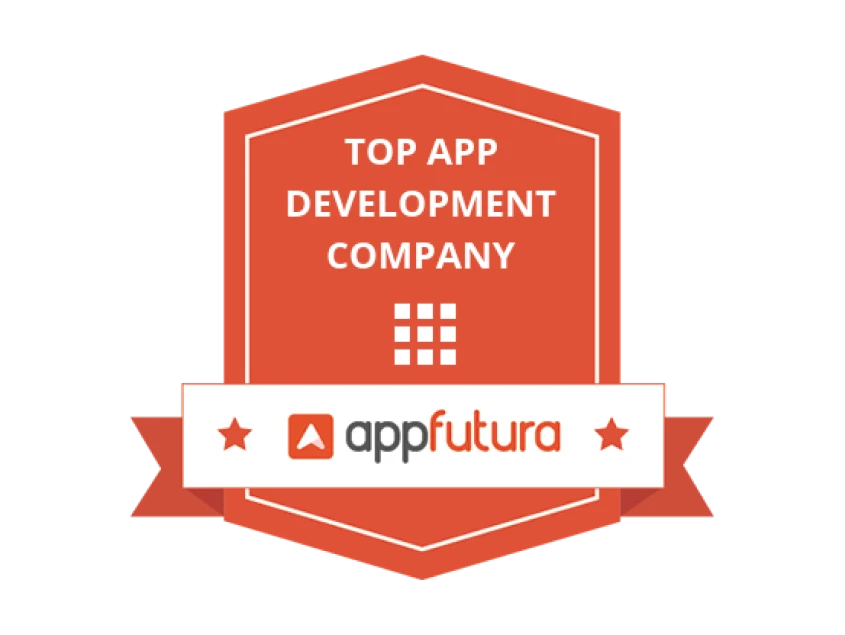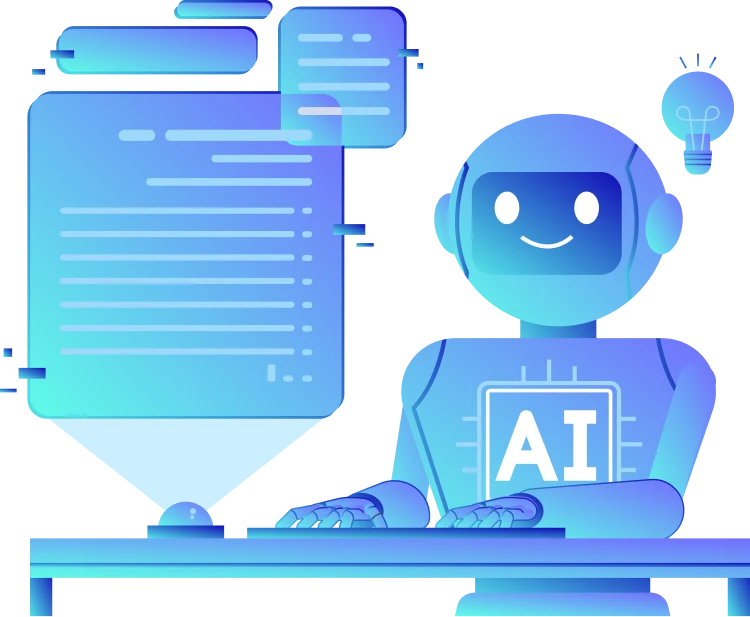
12 Ways How AI is Transforming The Ed- Tech Industry
April 09, 2024
AI In Ed- Tech Industry
In today’s world, artificial intelligence (AI) has seamlessly woven itself into the fabric of our daily lives, transforming industries across the board in ways previously unimaginable. Whether it’s revolutionizing the way we play sports, construct houses, or educate ourselves, AI’s influence knows no bounds.
As of the latest available data, the trends in AI-driven advancements continue to drive rapid growth in the EdTech sector. These advancements include personalized learning experiences, interactive lectures, gamified learning platforms, and other innovative approaches to enhance student engagement and skill acquisition. Projections suggest that the AI education market is on track to surpass $20 billion by 2027, reflecting the increasing adoption of AI technologies in educational settings worldwide.
Additionally, the revenue of the global e-learning market is anticipated to reach $166.60 billion by 2023, underscoring the growing demand for digital learning solutions and online educational resources. This growth trajectory highlights the expanding opportunities within the EdTech sector, driven by advancements in AI, digital learning platforms, and remote education delivery methods. In this blog we will discuss how Artificial Intelligence is transforming the Ed-Tech industry in 15 ways.
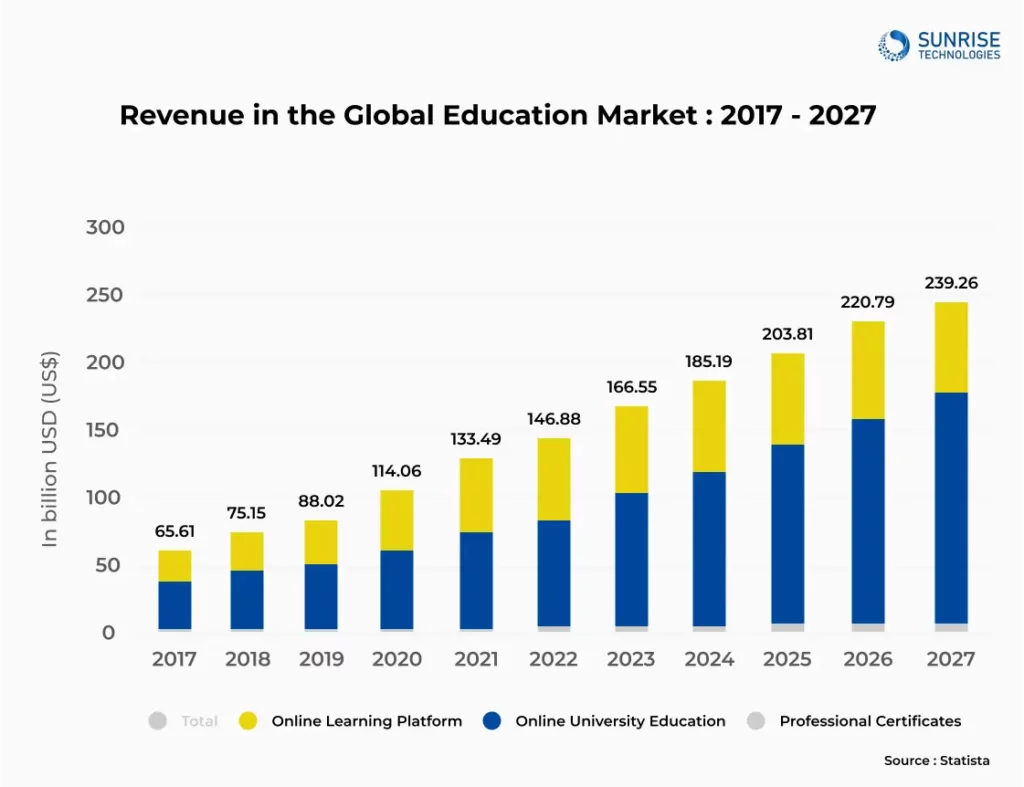
What is Ed-Tech?
Ed-tech is a short form of education technology that uses technologies to make learning and teaching easy. Ed-tech includes a wide range of digital tools, platforms, and resources to help and make learning special and easy. The ultimate goal of Ed-tech is to use the latest technology to improve educational outcomes, increase access to learning, and to make easier personalized and engaging learning experiences. Many Ed-tech companies have started implementing AI in their e-learning platforms to make learning and teaching much easier.
Ed-tech companies are now collaborating with ed-tech software development companies to implement artificial intelligence to revolutionize teaching and learning. Ed-tech companies use artificial intelligence to identify the gaps, personalizing the learning experience, world-class tutoring systems, etc.
The Evolution of Education: Embracing AI for Future Learning
Innovative AI-powered educational solutions are transforming traditional teaching approaches and setting the stage for education technology’s future. These innovative platforms leverage artificial intelligence to provide dynamic and personalized learning experiences by analyzing large volumes of data using complex algorithms.
By offering students personalized learning routes that cater to their unique abilities, limitations, and learning styles, AI-driven education goes above and beyond traditional methods. These platforms continuously modify and improve their content and delivery strategies to match the changing demands of every learner
Additionally, students can make real-time modifications and improvements according to the instant feedback on their performance provided by AI-powered educational systems. In addition to improving learning efficiency, this immediate feedback system helps students develop a sense of self-awareness and accountability.
The incorporation of AI trends is driving the EdTech industry’s explosive growth. These developments are changing how students engage with educational content by providing individualized learning opportunities through gamified classrooms, tailored courses, and interactive lectures. Because of this, it is anticipated that the market for AI education will grow to be worth over $20 billion by 2027, indicating the increasing need for creative solutions that improve student engagement and skill development.
Simultaneously, the worldwide e-learning industry is anticipated to experience substantial expansion, with earnings predicted to attain $166.60 billion by 2023. The increasing use of online learning platforms, particularly after the COVID-19 epidemic, which has sped up the transition to remote and virtual learning environments, is what’s causing this demand spike. Let us see how AI is Transforming the Ed-tech Industry in 15 ways.
Real World Example – Knewton’s Adaptive Learning Platform and Khan Academy
Knewton’s adaptive learning platform utilized AI and machine learning algorithms to analyze student performance data and provide personalized recommendations and content in real-time. Here are some features of Knewton leveraged AI in its platform, Adaptive Learning Paths, Personalized Recommendations, Real-time Feedback, Data Analytics Dashboard, Interactive Content, Integration with Learning Management Systems.
Khan Academy:
Khan Academy primarily focuses on providing high-quality educational content rather than extensively utilizing AI-driven adaptive learning technologies.
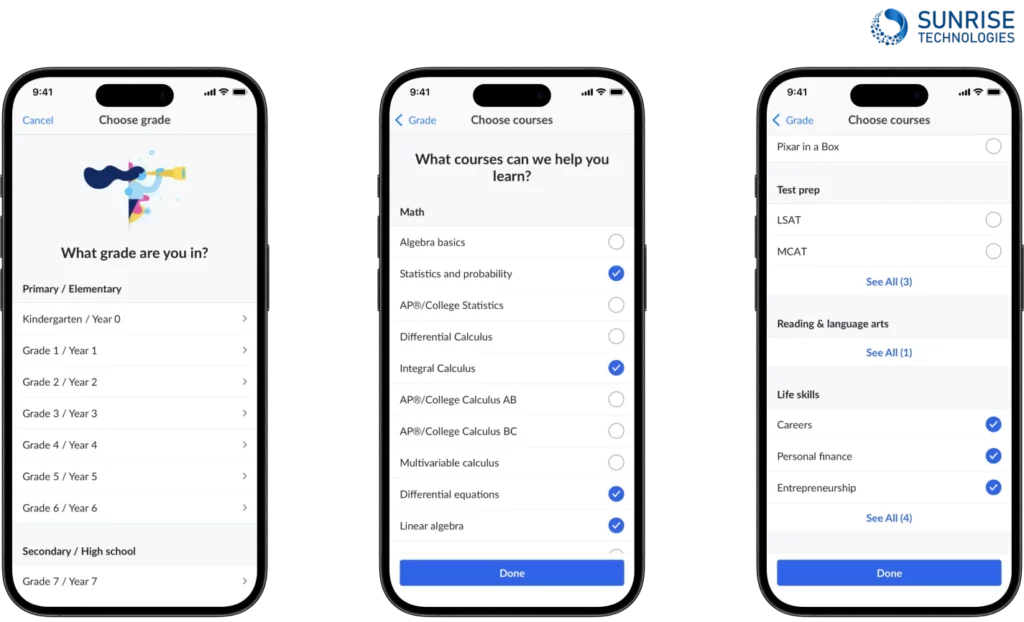
Personalized Practice Exercises:
Khan Academy uses AI to generate customized practice exercises and tutorials tailored to students’ proficiency levels and learning gaps.
Adaptive Learning Technology:
The platform adjusts the difficulty of questions based on individual performance, ensuring an optimal learning progression for each student.
AI-Powered Coaching:
Khan Academy’s AI-driven coaching features provide real-time feedback and hints to help students master challenging concepts at their own pace.
Comprehensive Learning Analytics:
AI analytics track student progress and performance, empowering instructors to identify areas for improvement and provide targeted support.
12 Ways or Advantages of AI Integration in Educational Technology
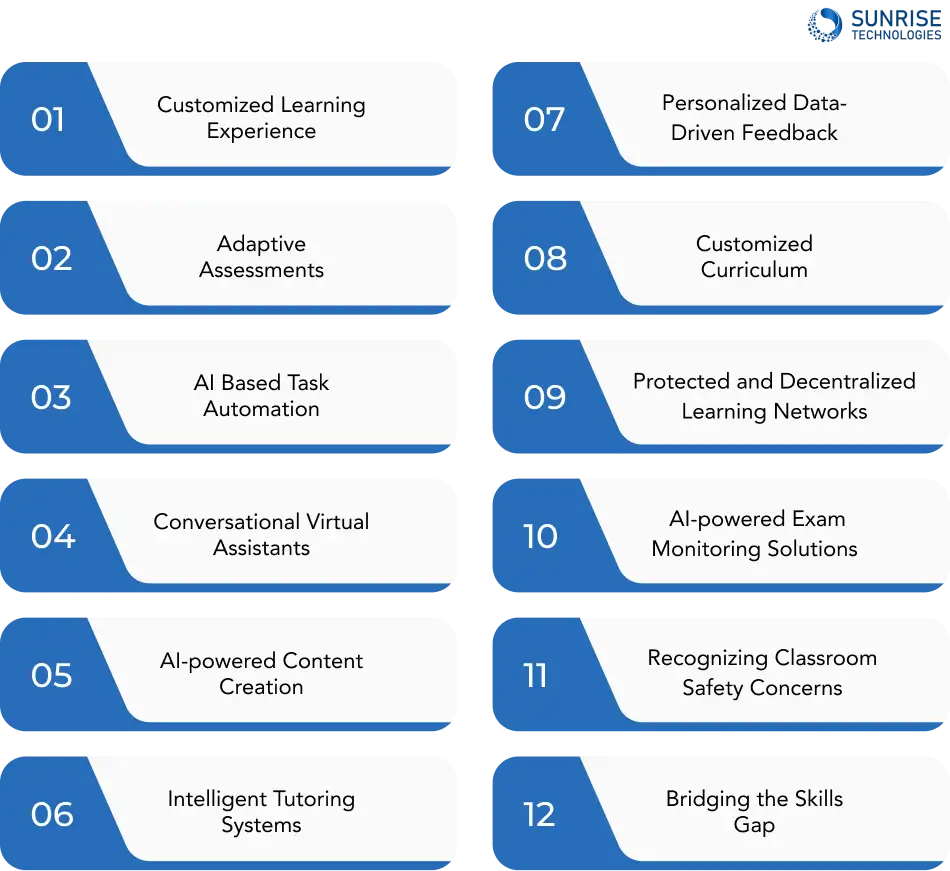
1. Customized Learning Experience
The traditional learning and teaching approach to education fails to recognize the diverse learning styles and paces at which students can absorb information. However, the integration of artificial intelligence (AI) into online education has revolutionized this landscape. AI in education is a game-changer, offering personalized learning experiences tailored to each student’s unique needs. Leveraging technologies such as machine learning (ML) and educational platforms can gauge how students engage with lessons and adapt in real time to optimize their learning journey.
This synergy between AI and education prioritizes individualized learning through a range of innovative tools, including AI-infused educational games, bespoke learning programs, and other features designed to enhance learning outcomes. By harnessing the power of AI, education becomes more accessible, engaging, and effective for every learner.
2. Adaptive Assessments
Adaptive assessments represent a groundbreaking approach to evaluating student learning, leveraging the power of AI to tailor assessments to individual abilities and learning trajectories. Unlike traditional standardized tests, adaptive assessments dynamically adjust question difficulty based on a student’s responses in real-time.
As a student progresses through the assessment, the algorithm adapts, presenting more challenging questions if the student answers correctly or adjusting to simpler questions if they struggle. This personalized approach ensures that each student is appropriately challenged, leading to more accurate and meaningful assessments of their knowledge and skills.
The advantages of adaptive assessments extend beyond personalized learning experiences. By providing immediate feedback and dynamically adjusting question difficulty, adaptive assessments offer valuable insights into student progress and areas for improvement. Educators can use this data to identify learning gaps, tailor instructional strategies, and provide targeted support to individual students.
3. AI Based Task Automation
With the integration of AI into school education and virtual classrooms, technology assumes responsibility for numerous value-added tasks. AI solutions for education not only facilitate personalized teaching processes but also undertake tasks such as homework assessment, test grading, research paper organization, report maintenance, presentation and note creation, and management of various administrative duties. As technology continues to advance, the potential for AI-based automation to transform e-learning and improve learning outcomes remains vast, promising a more effective and engaging educational experience for all.
4. Conversational Virtual Assistants
AI-powered virtual assistants like chatbots provide instant support to students, answering questions, offering guidance, and providing feedback. These virtual assistants enhance the learning experience by providing on-demand assistance, thereby promoting self-directed learning. Virtual assistants can also assist educators by automating administrative tasks, such as scheduling, grading, and managing course materials. By enabling educators and students to allocate their time more effectively, virtual assistants enhance the efficiency and productivity of the learning environment.
In addition to their role in streamlining administrative tasks, virtual assistants also play a crucial role in facilitating communication and collaboration within the virtual classroom. They serve as accessible resources for students seeking clarification or additional information, ensuring that learning continues uninterrupted. Moreover, virtual assistants can personalize the learning experience by delivering tailored content recommendations and learning pathways based on individual student preferences and needs. By fostering a supportive and interactive learning environment, virtual assistants contribute to the overall success and effectiveness of AI integration in education.
5. AI-powered Content Creation
One of the most impactful applications of AI in content creation is information visualization. Unlike traditional teaching methods that rely solely on verbal or textual explanations, AI-enabled smart content creation leverages visual elements to stimulate immersive learning experiences. From 2D to 3D visualization, students can interact with dynamic visualizations that bring complex concepts to life, fostering deeper understanding and retention.
Additionally, AI technology facilitates the generation of digital lessons, providing bite-sized learning materials that are easily accessible and highly adaptable. These digital resources offer flexibility and convenience, enabling students and educators to access study materials from any device, anytime, anywhere. By minimizing the storage requirements and maximizing accessibility, AI-powered digital lessons streamline the learning process and promote seamless remote learning opportunities.
6. Intelligent Tutoring Systems

Intelligent tutoring systems leverage AI to simulate one-on-one tutoring sessions. These systems assess student knowledge, adapt instructional strategies, and provide real-time feedback to optimize learning outcomes. By personalizing instruction and scaffolding learning activities, intelligent tutoring systems help students master complex concepts and skills at their own pace. Moreover, these systems can track student progress and performance, allowing educators to identify areas for improvement and intervene as needed.
In addition to supporting student learning, intelligent tutoring systems also provide valuable insights for educators. By analyzing data on student performance and engagement, these systems offer educators actionable information to inform their teaching practices and decision-making processes. From identifying misconceptions to tailoring instructional interventions, intelligent tutoring systems empower educators to optimize learning experiences and foster student achievement.
7. Personalized Data-Driven Feedback
Personalized feedback plays a pivotal role in shaping impactful learning environments, be it in a corporate setting or educational institution. The hallmark of effective teaching lies in the provision of ongoing feedback rather than mere dissemination of content. Ensuring that feedback emanates from a reliable source is paramount. Thus, the integration of AI in education facilitates the analysis and evaluation of work reports based on real-time data.
The implementation of a data-driven feedback system not only enhances student satisfaction but also mitigates the influence of bias in the learning process. By meticulously scrutinizing everyday data, AI technology aids in pinpointing areas where skills may be lacking, thus fostering a deeper understanding of individual learning needs. This tailored feedback mechanism is meticulously tailored to reflect the performance of each student and employee, meticulously recorded and analyzed within the system.
8. Customized Curriculum
AI algorithms analyze learning patterns to adapt curriculum content and pacing, ensuring alignment with student abilities and interests. By understanding each student’s unique learning patterns, AI technology optimizes the curriculum to maximize engagement and comprehension. This personalized approach promotes a more effective and enjoyable learning experience, ultimately leading to better academic outcomes.
Moreover, customized curriculum powered by AI fosters a sense of ownership and autonomy among students, as they have a more active role in their learning journey. By catering to individual learning styles and preferences, AI-driven curriculum design empowers students to take charge of their education, fostering a deeper sense of motivation and self-directed learning.
9. Protected and Decentralized Learning Networks
AI-driven decentralized solutions hold the promise of catalyzing a positive technological revolution within the education sector. By leveraging decentralized technologies, such as blockchain, educational institutions can enhance data security, ensure immutable records, and streamline certification processes. These innovative solutions not only address existing challenges but also pave the way for greater transparency, efficiency, and trust within the education ecosystem. As the education industry continues to evolve, AI-based decentralized solutions stand poised to revolutionize the sector, unlocking new possibilities for learning, credentialing, and advancement.
10. AI-powered Assessment Solutions
AI software systems play a crucial role in examinations and interviews by actively detecting suspicious behavior and alerting supervisors. These AI systems observe individuals using web cameras, microphones, and web browsers, analyzing keystrokes to detect any irregular activity. By leveraging advanced algorithms, AI-powered assessment solutions enhance exam integrity and ensure fair assessment practices.
Furthermore, AI-based application solutions offer multifaceted benefits across the education sector. EdTech startups and enterprises are increasingly drawn to AI technology solutions that effectively address users’ diverse needs and challenges. As such, integrating AI solutions into professional education businesses has become imperative, ushering in a new era of innovation and efficiency in the education sector.
11. Recognizing Classroom Safety Concerns
While AI technology in education undeniably offers significant benefits, one of its most impactful advantages lies in its ability to reduce our environmental footprint through remote learning initiatives. However, concerns have arisen regarding the potential for AI to replace human interaction in the learning process. Contrary to this belief, the integration of AI in education serves to augment rather than supplant the human touch.
It’s essential to recognize that AI serves as a valuable tool to support educators, enriching the teaching-learning experience for individuals. Rather than replacing human expertise, AI empowers educators to personalize instruction, identify learning gaps, and offer tailored support to students. By harnessing the capabilities of AI, educators can leverage data-driven insights to optimize the learning journey, fostering greater engagement, comprehension, and academic success.
12. Bridging the Skills Gap
Helping students develop new skills presents a valuable solution for businesses facing technology challenges. AI and ML-driven software and applications provide students with accessible and cost-effective opportunities to enhance their skills through learning.
Moreover, upskilling current employees can enhance morale and inspire a company-wide dedication to growth and innovation. Additionally, AI’s integration into education impacts Learning and Development (L&D) by analyzing how individuals learn. By adapting to human learning methods, AI automates the learning process to better suit each individual’s needs.
Revolutionizing EdTech Ventures with AI Integration by Sunrise Technologies
Sunrise Technologies stands at the forefront of revolutionizing the educational technology landscape through cutting-edge AI integration. With a commitment to innovation and excellence, Sunrise Technologies delivers top-notch AI and ML development services tailored specifically for EdTech businesses. Our team of expert developers harnesses the power of artificial intelligence to create bespoke solutions that address the unique challenges and opportunities within the education sector.
By leveraging advanced AI algorithms and machine learning techniques, Sunrise Technologies enables EdTech ventures to unlock new possibilities and enhance learning experiences for students and educators alike. From personalized learning pathways to adaptive assessment tools, our AI-driven solutions empower EdTech businesses to stay ahead of the curve and drive meaningful impact in the education industry.
With Sunrise Technologies – best education mobile app development company, as your partner, you can trust that your EdTech venture will receive the best-in-class AI development services, paving the way for success and innovation in the rapidly evolving world of education technology. Don’t let your EdTech venture fall behind – embrace AI today! Schedule a meeting with our experts to take your education technology business to the next level.
Sam is a chartered professional engineer with over 15 years of extensive experience in the software technology space. Over the years, Sam has held the position of Chief Technology Consultant for tech companies both in Australia and abroad before establishing his own software consulting firm in Sydney, Australia. In his current role, he manages a large team of developers and engineers across Australia and internationally, dedicated to delivering the best in software technology.

